- Home
- Jim Eldridge
Murder at the British Museum Page 5
Murder at the British Museum Read online
Page 5
‘Yes, sir,’ said Armstrong. ‘I believe that to be the case.’
‘Will you explain to me why the museum feels the need to engage the services of a private detective on such an important matter as this?’ the commissioner demanded.
‘I believe this particular agent has an existing relationship with the museum, sir. He helped resolve a situation regarding a stolen Saxon jewel.’
‘Helped?’ snapped the commissioner.
Armstrong hesitated, then admitted, ‘I understand he solved it, sir. He brought the identity of the culprit to the attention of the police, and we subsequently charged the thief with the crime.’
‘He solved it. Not you.’
‘I was not involved with that particular case, sir.’
‘That’s not the point!’ snapped the commissioner angrily. ‘The fact is that the museum, by engaging this person, has expressed its lack of confidence in the police to solve this crime. And a very high-profile crime, I may add, the murder of a leading academic and author in such an institution as the British Museum.’
‘With respect, sir, we haven’t had sufficient time yet to investigate,’ protested Armstrong. ‘The murder only happened a few days ago. We are still gathering evidence.’
‘But not fast enough to satisfy the museum!’ barked the commissioner. ‘I don’t like this, Armstrong. There have been too many cases recently where the reputation of the police force in the eyes of the public has been undermined. This is just one such example, and it’s happening on a case you are in charge of. I want this situation dealt with, Superintendent. You will solve this heinous crime. You and your men. Not some private detective. I will not stand by and let the reputation of this force be tarnished. Solve this crime, Superintendent, and solve it quickly! And that is an order!’
First thing next morning Daniel sought out Howard Wills, and found him on duty in the rooms that housed the Saxon collection. Wills looked every inch a former sergeant major, tall, rigid, straight-backed, although in civilian life his muscle had mostly turned to fat. With the left sleeve of his uniform pinned up to show his missing arm, and his excess weight, Daniel understood why it would have been difficult for Wills to climb over the toilet cubicle partition.
Daniel introduced himself and showed Wills the card Sir Jasper had given him.
‘Terrible tragedy, sir,’ said Wills. ‘It was lucky it was me who found him, being used to sudden violent death. One of the other attendants without that experience might have gone to pieces.’
‘Indeed,’ said Daniel. ‘I understand you were in the army.’
‘Northamptonshires, 58th Regiment,’ confirmed Wills. He indicated his empty sleeve. ‘Lost my arm at Majuba Hill. 1881.’
The Battle of Majuba Hill, reflected Daniel. The final battle of the Boer War, the crushing defeat of the British which led to the Boers’ victory and the reinstatement of the Republic of South Africa.
‘It must have been a terrible experience,’ said Daniel sympathetically.
‘No war is a good experience when you lose, sir,’ said Wills.
‘True,’ agreed Daniel. ‘Tell me about finding the body.’
‘He was definitely dead, sir. There was a lot of blood. There was blood on the back of his coat as well as on his shirtfront, so I could tell he’d been stabbed more than once. And there was a wound in his throat, just below his chin.’
‘It sounds like a savage attack,’ said Daniel.
‘That was my thought, sir. I heard later that the doctor who examined the body found seven stab wounds. Two in the back, four in his front, and that one to the neck.’
‘And you didn’t see anyone when you came down?’
‘No, sir. Mr Ashford sent me to find the professor because the audience was waiting. I came down the stairs and went into the conveniences. There was no one else in, just the one cubicle door closed. It was when I saw the blood trickling out from under the door I knew at once something was wrong. I banged on the door but there was no answer. I went into the next cubicle and climbed on the toilet seat and looked over, but all I could see was an arm lying on the toilet seat.’ He indicated his empty sleeve. ‘Because of this I couldn’t climb over the partition, so I went to the storeroom and got a hammer and bashed the lock open. And there he was. Lying on the floor between the wall and the toilet bowl.’
‘What about the sign on the door?’ asked Daniel. ‘The one that said “Out of Order”.’
‘Yes, sir. That puzzled me,’ said Wills. ‘It wasn’t there when I showed the professor down, that I’m sure of. When I saw it, I thought it meant there was a cleaner inside, but when I entered there was no one at all, just that closed cubicle door.’
‘So, you saw no one?’
‘No one at all.’
Daniel thanked Wills and then started back towards their small office to share Wills’ account with Abigail. But instead, he made for the exhibition, remembering their conversation the previous evening when she’d urged him to study the displays.
‘You told me that the exhibition may contain the clues we’re looking for, but I can only look at it from a historical perspective,’ she’d told him. ‘You are the trained detective.’
‘I shall be groping in the dark,’ he’d protested. ‘Much of this is strange to me. Yes, I know the stories about Arthur and Guinevere, and Lancelot and the Lady of the Lake …’
‘The fictional Arthur,’ said Abigail. ‘Pickering’s book is about the historical Arthur.’
And so, Daniel directed his attention to the later parts of the exhibition, those focusing on the real Arthur, and found himself looking at pages from ancient texts displayed in glass cases. But the language of them wasn’t even English. Latin, possibly, but not a Latin he’d seen before.
‘Taking it all in?’ said a voice.
Daniel turned and saw John Feather.
‘John! You got my note?’
‘I did,’ said Feather.
‘I thought meeting here would be better for us, as Superintendent Armstrong threatened to throw me out if he saw me in the Yard again,’ said Daniel.
‘Yes, he came to see me after he’d bumped into you and warned me about allowing you in the building. He still remembers.’
‘It was a long time ago,’ said Daniel. ‘When he was just an ordinary detective sergeant, the same as me.’
‘He was never the same as you, Daniel. I also heard that the commissioner was looking for him first thing this morning, and seemed to be on the warpath; so I took the opportunity to head out of the Yard before whatever wrath the commissioner is feeling gets passed on to me.’ He indicated the display cases. ‘What have you learnt?’
‘That I can’t understand what the writing says, so I don’t know the half of what this is all about.’ Daniel sighed. ‘Come up and meet Miss Fenton.’
Daniel led the way towards a narrow winding staircase to one side of the main reception area. ‘We’ve been allocated a room just up here. It’s small, but it serves us.’
He mounted the stairs, Feather following, to a small landing, and then through the open doorway into the tiny room. Abigail got up from the small table she was sitting at and gave a smile of welcome.
‘You must be Inspector Feather,’ she said. ‘Daniel said he’d asked you to call.’
‘Please, call me John.’
‘Abigail,’ said Abigail, and they shook hands.
‘Luckily, we’ve been able to squeeze a third chair in,’ said Daniel. ‘As I mentioned, Abigail is working with me on the case.’
‘Yes, Daniel has been singing your praises loudly,’ said Feather.
‘To be taken with a very large pinch of salt,’ said Abigail. ‘When it comes to detective work, I am very much the novice.’
‘As we all are,’ said Feather. ‘Always learning. Right, Daniel?’
‘Very true,’ said Daniel. ‘Anyway, I thought it might be useful to catch up. We met Mrs Pickering yesterday afternoon. There was a young man at her house. A Mr Tudder.’
&nb
sp; ‘The artist.’ Feather grinned.
Daniel and Abigail exchanged puzzled looks.
‘The artist?’ repeated Abigail.
‘That’s the official story, according to the servants.’ He winked. ‘I used one of your old tricks, Daniel. Sending someone out to pick up gossip. Some of it may be just that, idle chatter, but often you find a nugget of gold. It seems that Mrs Pickering is having her portrait painted by this Joshua Tudder, who is said to be a rising young artist. In fact, their joint alibi for the time Professor Pickering was killed was that they were in his studio.’ He hesitated, then said, ‘However, according to the gossip, what they were doing there is open to speculation.’
‘They are having an affair,’ said Abigail. ‘That was obvious from the way they were with one another.’
‘Yes, that was my guess,’ said Feather.
‘Mrs Pickering was very reluctant to give us any information about her portrait being painted,’ said Daniel.
‘That is because she claimed it was being done as a secret gift for her husband,’ said Feather. ‘At least, that’s what she told her servants, so they were sworn to keep her visits to Tudder’s studio a secret from the professor.’
‘Very convenient,’ commented Daniel. ‘And clever. I have no doubt that if you investigated, you would indeed find a portrait of Mrs Pickering in Tudder’s studio. Unfinished, of course.’
‘Exactly,’ said Feather. ‘What interests me more is who Tudder might have been in contact with.’
‘An assassin.’ Daniel nodded. ‘You spotted the items that showed they were Catholics?’
‘The Bleeding Heart. A rosary. So, the only way that Tudder and Mrs Pickering could be legally married, and Mrs Pickering to inherit his wealth and property, is if Pickering died. Which, conveniently, he did.’
‘So, they’re your main suspects at the moment?’ asked Abigail.
Feather frowned. ‘Only because we haven’t got anyone else in the frame, not if it was a calculated killing.’
‘Superintendent Armstrong told Mrs Pickering it was the work of a lunatic. A random killing,’ said Daniel.
Feather shrugged. ‘Yes, that’s his opinion. Makes for an easier defence when he fails to turn up the killer. It wouldn’t surprise me if some poor soul fished out of the Thames fits with the profile of the person Armstrong says he’s looking for.’
‘Case solved. Kudos for Superintendent Armstrong.’ Daniel sighed.
‘But that’s outrageous!’ burst out Abigail. ‘That would be a fraud!’
‘And who would question it?’ asked Daniel. ‘Especially if the person pulled out of the Thames has no family to defend him.’
‘You’d be surprised how many people have reached the top of their particular profession through false credentials, Miss Fenton,’ added Feather. ‘And unfortunately, the police force is not exempt.’
‘So, apart from Superintendent Armstrong’s lunatic, and our suspicions about Mrs Pickering and Joshua Tudder, what other options are the Yard looking at, John?’
Feather sighed and gave a shrug. ‘None, truth be told. We’ve taken a look into Pickering’s life, but he seems to be exactly what he appears to be: a respectable professor of history who writes books and lectures. There seems no reason why anyone would want to kill him. Which leaves us with the other option: that it was the museum itself that was the target.’
Daniel walked Feather back downstairs, both men promising to keep in touch, and then Daniel returned to the exhibition. He still wasn’t sure how it could help him come to any conclusions about why Pickering had been killed, but Abigail seemed to be of that opinion, and he’d learnt that she had one of the sharpest minds he’d ever encountered. He was studying the exhibits, when a cheerful voice beside him said, ‘Daniel. I heard you were here.’
Daniel turned and grinned in delight at seeing the portly figure of Joe Dalton. ‘Joe!’ he said. ‘This is a pleasure! Long time, no see.’
Dalton was a reporter for the Daily Telegraph and his speciality was crime. They’d first met seven years before, when Daniel had been part of Abberline’s team investigating the Jack the Ripper murders.
‘A little bird told me you’d been brought in by the museum to look into the professor murder,’ said Dalton.
‘There must be a lot of talking birds around,’ grunted Daniel. ‘I was caught by Ned Carson the other day. Remember him?’
Dalton laughed. ‘The People’s Voice. How could I forget him? Still claiming to be a reporter?’
‘Who buys the People’s Voice?’ complained Daniel. ‘It’s just a rag!’
‘Lots of people like that sort of stuff.’ Dalton shrugged. ‘They prefer to read dirt about people rather than hard news.’
‘Most of the time the stuff they write isn’t even true!’ burst out Daniel. ‘It’s just hints and innuendoes. Smears.’
‘And not enough so they can be sued for libel. So, what about this case. Any leads?’
‘Early days, Joe. You’d be better advised to have a word with John Feather.’
‘I already have,’ said Dalton. ‘The trouble is he has to be careful what he says because he’s got Armstrong watching over his shoulder the whole time.’ He gestured at the exhibition. ‘So, crime of passion? Or is the answer here somewhere?’
‘I wish I knew,’ admitted Daniel. ‘What have you picked up yourself?’
‘Nothing.’ Dalton sighed. ‘I’ve tried digging into Pickering’s life looking for a motive, but no one’s saying anything off about him, just that he was a pillar of society.’
‘And you have doubts about that?’
‘I’ve no idea,’ said Dalton. ‘I never met the man. But it strikes me that for someone to get stabbed to death, he must have upset someone. That is, if he was the target.’
‘Is there any reason to think he wasn’t?’
‘Well, we’ve both known of people being killed because of mistaken identity.’
‘True, but those are usually people who look anonymous, or have a resemblance to someone else. Looking at the picture of the professor on the book display, he looks fairly individual.’
‘I don’t know,’ said Dalton thoughtfully. ‘To me, he looks like a lot of the toffs you see around London. So, are you back in the metropolis for a while? I keep hearing about you going off to distant parts. There was that case in Cambridge. The reanimated murderous mummy.’
Daniel laughed. ‘A reporter’s invention.’ He chuckled. ‘Yes, I’m certainly back while this case is on.’ He gestured towards the stairs. ‘In fact, come on up to our office and meet my investigating partner.’
‘A partner?’ said Dalton, surprised. ‘I thought you worked on your own, ever since you left the force.’
‘Yes, but now and then two heads can be better than one, especially with her mind. She’s clever. I also think you’ll like her.’
‘Her?’ Dalton smiled. ‘Now this is intriguing.’
CHAPTER EIGHT
Abigail was writing something when Daniel appeared, but she stopped as soon as she saw Daniel had someone with him.
‘Abigail Fenton, meet Joe Dalton,’ Daniel introduced them to one another. ‘Joe’s a reporter for the Daily Telegraph, and highly reputable. Miss Fenton is a history graduate from Girton College, Cambridge, a celebrated archaeologist who has conducted major digs at most of the major sites of the pyramids in Egypt, and has just returned from a series of explorations along Hadrian’s Wall.’
They shook hands as Dalton asked, ‘Pardon me for asking, Miss Fenton, but with all those qualifications, what on earth are you doing here with Daniel?’
‘Call me Abigail, please. If Daniel counts you as a friend and someone to be trusted, then so shall I. The answer is, Daniel has asked me to help him solve the murder of Professor Pickering.’
‘So, you’re a detective as well,’ said Dalton admiringly.
‘A trainee detective,’ she corrected him.
‘Joe and I first met when Inspector Abberline and I were on the Ripper
case. Joe was one of the few who was after facts rather than sensational garbage.’
‘And there was a lot of garbage around at that time,’ said Dalton. ‘Black magic. Witchcraft. Ritual killings.’
‘The royal family,’ added Daniel. ‘A mad surgeon.’
‘But he was never caught, was he,’ said Abigail.
‘Sadly, no,’ said Daniel.
‘But Daniel and Fred Abberline got close,’ said Joe. ‘It was only the powers-that-be that stopped them making an arrest.’
Abigail looked quizzically at Daniel. ‘You never told me,’ she said.
‘It was a long time ago,’ said Daniel.
‘It’s only eight years,’ she said.
‘True. But the person we had our eye on is dead now. So, better to concentrate on the here and now. What were you working on?’
Abigail showed him a short list she’d written. ‘I was thinking about what John Feather said: that perhaps the museum itself was the target,’ said Abigail. ‘So, I was making a list of possible reasons. There’s a lot of resentment in some foreign countries about artefacts that have been taken from them to be displayed somewhere far away. Like the Elgin Marbles, for example, which were taken from the Parthenon and brought to Britain. The Greeks are still very angry they’re here in the British Museum instead of being on display in their native Greece.’
‘It’s an interesting thought, but in my experience, most crimes are committed against people rather than institutions,’ said Daniel.
‘That’s not strictly true,’ said Dalton. ‘Look at the recent attacks there have been on government buildings by Irish home rule terrorists.’
‘That’s different, that’s politics,’ countered Daniel. ‘They claim they’re fighting for Irish independence.’
‘But they’re still crimes,’ said Dalton.
‘Exactly.’ Abigail nodded. ‘Mr Dalton and I are as one on this.’
Dalton grinned at Daniel. ‘You’re right, Daniel. Clever indeed.’
‘Only because she’s agreeing with you,’ grumbled Daniel. ‘But why would anyone want to attack the British Museum?’

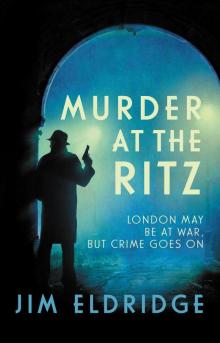 Murder at the Ritz
Murder at the Ritz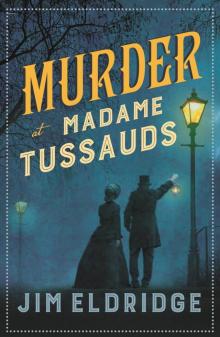 Murder at Madame Tussauds
Murder at Madame Tussauds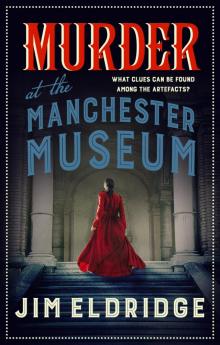 Murder at the Manchester Museum
Murder at the Manchester Museum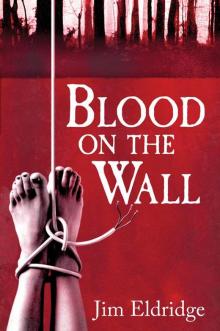 Blood On the Wall
Blood On the Wall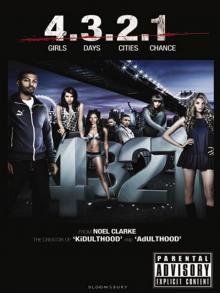 4.3.2.1
4.3.2.1 Jungle Kill (Black Ops)
Jungle Kill (Black Ops)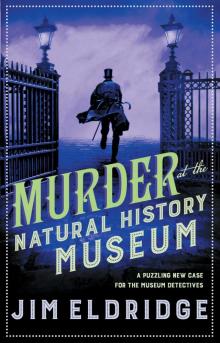 Murder at the Natural History Museum
Murder at the Natural History Museum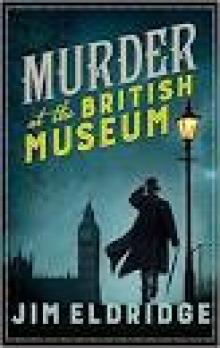 Murder at the British Museum
Murder at the British Museum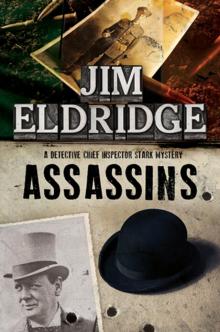 Assassins
Assassins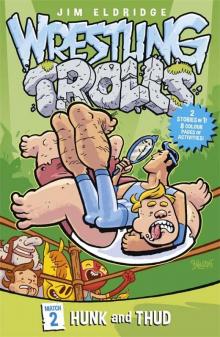 Hunk and Thud
Hunk and Thud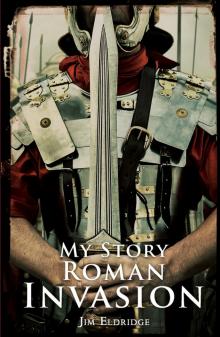 Roman Invasion
Roman Invasion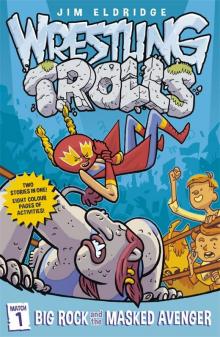 Big Rock and the Masked Avenger
Big Rock and the Masked Avenger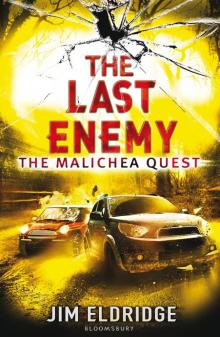 The Last Enemy
The Last Enemy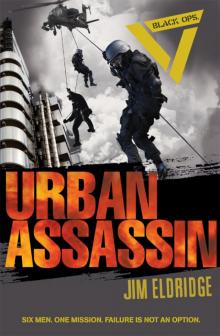 Urban Assassin
Urban Assassin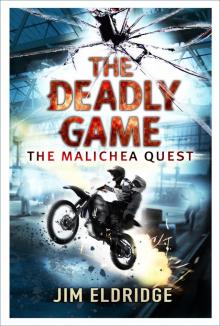 The Deadly Game
The Deadly Game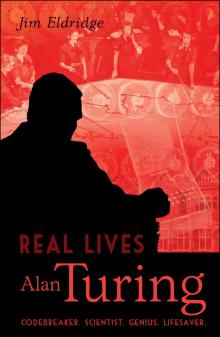 Alan Turing
Alan Turing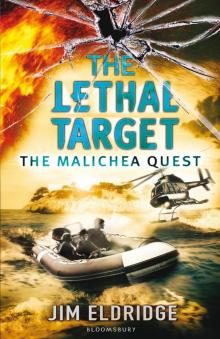 The Lethal Target
The Lethal Target The Giant Rumble
The Giant Rumble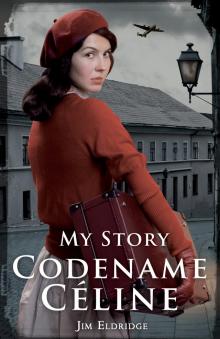 Codename Céline
Codename Céline Death in the Desert
Death in the Desert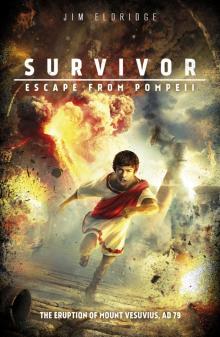 Escape from Pompeii
Escape from Pompeii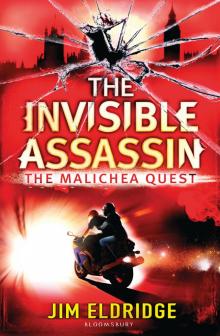 The Invisible Assassin
The Invisible Assassin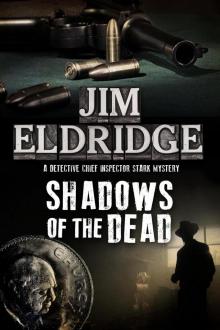 Shadows of the Dead
Shadows of the Dead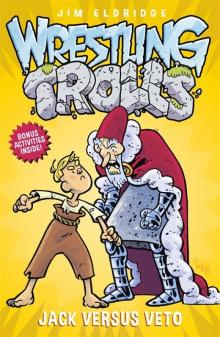 Jack Versus Veto
Jack Versus Veto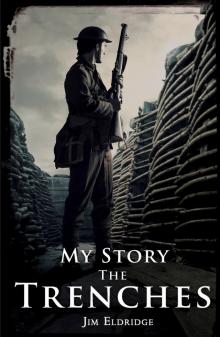 The Trenches
The Trenches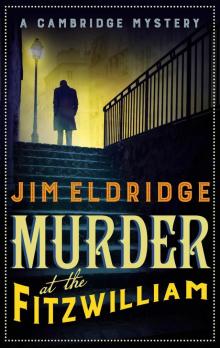 Murder at the Fitzwilliam
Murder at the Fitzwilliam Coming Home
Coming Home